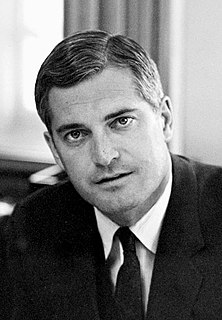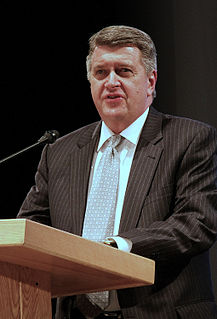A Quote by Bertrand Russell
The Mormons had a divine revelation in favour of polygamy, but under pressure from the United States Government they discovered that the revelation was not binding.
Related Quotes
One major difference between Mormons and evangelicals on the subject of revelation is that Latter-day Saints believe that God has appointed modern-day prophets and apostles to receive revelation for Christ's church. All church members may receive revelation appropriate for their particular callings or positions within the church and their families, but never in contradiction to church doctrine or policy. So Mormonism has both a democratic practice of revelation that would resonate with evangelicals, but also an institutional understanding of revelation foreign to evangelicalism.
The principle of plural marriage was revealed to the Mormons amid much secrecy. Dark clouds hovered over the church in the early 1840s, after rumors spread that its founder, Joseph Smith, had taken up the practice of polygamy. While denying the charge in public, by 1843 Smith had shared a revelation with his closest disciples.
We believe in honesty, morality, and purity; but when they enact tyrannical laws, forbidding us the free exercise of our religion, we cannot submit. God is greater than the United States, and when the Government conflicts with heaven, we will be ranged under the banner of heaven and against the Government...Polygamy is a divine institution. It has been banded down direct from God. The United States cannot abolish it. No nation on the earth can prevent it, nor all the nations of the earth combined...I defy the United States; I will obey God.
When the Constitution of the United States was framed and adopted, those high contracting parties did positively agree that they would not interfere with religious affairs. Now, if our marital relations are not religious, what is? This ordinance of marriage was a direct revelation to us, through Joseph Smith, the prophet. . . . This is a revelation from God and a command to his people, and therefore it is my religion. I do not believe that the Supreme Court of the United States has any right to interfere with my religious views, and in doing it they are violating their most sacred obligations.
How wonderful it is that we believe in modern revelation. I cannot get over the feeling that if revelation were needed anciently, when life was simple, that revelation is also needed today, when life is complex. There never was a time in the history of the earth when men needed revelation more than they need it now.
...[sacred] doctrine is especially based upon arguments from authority, inasmuch as its principles are obtained by revelation: thus we ought to believe on the authority of those to whom the revelation has been made. Nor does this take away from the dignity of this doctrine, for although the argument from authority based on human reason is the weakest, yet the argument from authority based on divine revelation is the strongest.
I believe in revelation, but not in revelation which each religion claims to possess, but in the living revelation which surrounds us on every side - mighty, eternal, unceasing, incorruptible, clear, distinct, universal as is the being from whom it proceeds, in that revelation which speaks to us and penetrates us from the moment we are born until we die.
Emma took the revelation, on polygamy supposed she had all there was; but Joseph had wisdom enough to take care of it, and he had handed the revelation to Bishop Whitney, and he wrote it all off... She went to the fireplace and put it in, and put a candle under it and burnt it, and she thought that was the end of it, and she will be damned as sure as she is a living woman. Joseph used to say that he would have her hereafter, if he had to go to hell for her, and he will have to go to hell for her as sure as he ever gets her.
I am open to [the notion of theistic revelation], but not enthusiastic about potential revelation from God. On the positive side, for example, I am very much impressed with physicist Gerald Schroeder's comments on Genesis 1. That this biblical account might be scientifically accurate raises the possibility that it is revelation.

































